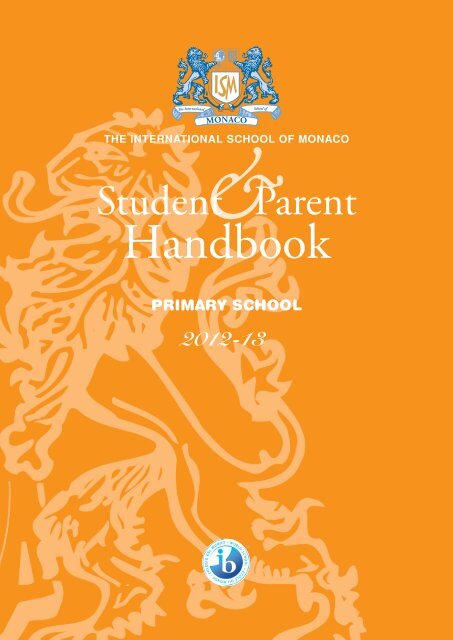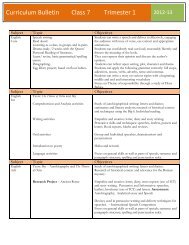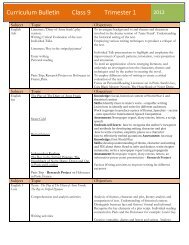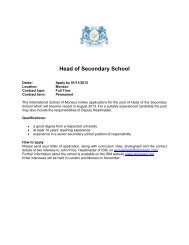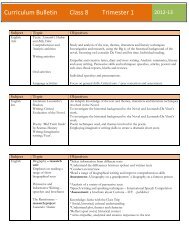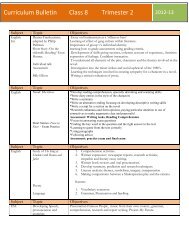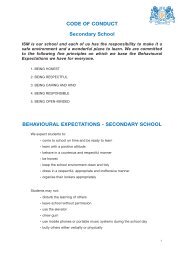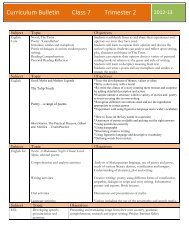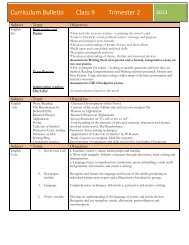Handbook Primary - The International School of Monaco
Handbook Primary - The International School of Monaco
Handbook Primary - The International School of Monaco
Create successful ePaper yourself
Turn your PDF publications into a flip-book with our unique Google optimized e-Paper software.
THE INTERNATIONAL SCHOOL OF MONACO<br />
&<br />
Student<br />
Parent<br />
<strong>Handbook</strong><br />
PRIMARY SCHOOL<br />
2012-13<br />
©
Dear Parents,<br />
I would like to wish you all a very warm welcome to the <strong>Primary</strong> school. My name is Jenny<br />
O’Fee and as Head <strong>of</strong> <strong>Primary</strong>, I am responsible for the daily running <strong>of</strong> the <strong>Primary</strong> <strong>School</strong>.<br />
At ISM we strive to provide an engaging, bilingual learning environment for all <strong>of</strong> our students,<br />
providing support, as well as challenging each individual learner to fulfil their potential.<br />
<strong>The</strong> <strong>Primary</strong> <strong>School</strong> Staff is a committed, learning-focused team <strong>of</strong> teachers, who place value<br />
on students gaining fulfilment and satisfaction from their learning. I believe that effective<br />
communication between students, parents and teachers is <strong>of</strong> great importance and as such,<br />
will endeavour to continue to build the strong relationships that will promote and foster a love<br />
<strong>of</strong> learning in our community.<br />
<strong>The</strong> following <strong>Handbook</strong> is intended to be a practical, informative guide for parents to explain<br />
the daily operation <strong>of</strong> the <strong>Primary</strong> <strong>School</strong>. Within the handbook you will find the school’s<br />
Mission Statement and Goals, the policies, which govern the running <strong>of</strong> the school, as well as<br />
the <strong>Primary</strong> <strong>School</strong> Curriculum.<br />
Should you have any queries or questions regarding your child, please consider the class<br />
teacher your first point <strong>of</strong> contact. Appointments can be made to meet with teachers through<br />
the school reception or directly with the teacher themselves. However, should you require any<br />
further assistance, please do not hesitate to make an appointment to meet with me.<br />
I look forward to working collaboratively with students, staff and parents to create a positive,<br />
learning atmosphere, where every individual can successfully grow, both academically and<br />
socially.<br />
Warmest regards,<br />
Miss. Jenny O’Fee<br />
Head <strong>of</strong> <strong>Primary</strong> <strong>School</strong><br />
1
OUR<br />
MISSION<br />
Our mission is to enable students to become academically and personally<br />
successful people who are internationally minded, and motivated to<br />
become lifelong learners and caring citizens prepared to take effective<br />
responsibility in an ever changing world.<br />
INTERNATIONALLY MINDED<br />
SUCCESSFUL<br />
OPEN-MINDED<br />
• RESPONSIBLE<br />
• RESPECTFUL<br />
•<br />
• CARING<br />
• HONEST<br />
MOTIVATED<br />
Notre mission est d’assurer à nos élèves une réussite académique et<br />
personnelle et de leur transmettre un état d’esprit tourné vers<br />
l’international. Nous développons leur désir de s’impliquer dans ce qu’ils<br />
entreprennent et d’apprendre tout au long de leur vie. Ainsi, ils seront<br />
capables d’assumer leur responsabilité de citoyens dans un monde en<br />
perpétuelle évolution.<br />
2
WHAT WILL HELP US ACHIEVE OUR MISSION ?<br />
A CURRICULUM with clearly stated goals, content continuity and meaningful student<br />
assessment that promotes rigorous multi-lingual learning in all subjects.<br />
A STAFF who are internationally-minded, inspirational and reflective who are supportive <strong>of</strong><br />
the school’s mission statement, vision for learning, and values. <strong>The</strong>y are committed to their<br />
own continuous pr<strong>of</strong>essional development which will help them enhance and improve<br />
student learning.<br />
An ENVIRONMENT that is challenging, caring and supportive, where students feel safe both<br />
physically and emotionally to develop and fulfill their individual potential.<br />
<strong>The</strong> FACILITIES and RESOURCES that are appropriate to the age <strong>of</strong> the students, our class<br />
sizes, educational programmes and vision for learning and which continually meet the high<br />
standards that exist for safety, security and maintenance.<br />
<strong>The</strong> FINANCES which support the school’s operational programmes, allow for innovation,<br />
develop facilities and provide the salaries and benefits which allow us to recruit and retain<br />
excellent staff.<br />
A COMMUNITY SPIRIT which enables everyone to contribute to the achievement <strong>of</strong> our<br />
Mission in a way which models the values we want our students to acquire.<br />
COMMUNICATION that is respectful, clear and concise, that represents the bilingual nature<br />
<strong>of</strong> the school and reflects the excellence to which the school continually aspires.<br />
OUR DEFINITION OF LEARNING<br />
Learning is the acquisition and consolidation <strong>of</strong> knowledge and skills which leads to deeper<br />
understanding and helps students become more reflective, open-minded and independent.<br />
3
WHAT DOES ISM MEAN<br />
IN THE PRIMARY SCHOOL?<br />
<strong>International</strong>ly Minded<br />
We are learning more than one language to be better able to<br />
communicate with other people.<br />
We appreciate and respect other people’s cultures.<br />
We can express our ideas and opinions, as well as listen and<br />
respect those <strong>of</strong> others.<br />
We can work cooperatively with others, discussing and sharing<br />
ideas.<br />
We understand the importance <strong>of</strong> caring for<br />
our planet.<br />
We are learning about global issues that<br />
affect us all.<br />
We reach out to help others where it will<br />
make a positive difference.<br />
Successful Learners<br />
We attend school regularly, being on time and prepared for all lessons.<br />
We listen, participate, ask questions, think critically and seek assistance when needed.<br />
We are self disciplined, well organised and stay focused on our goals to improve.<br />
We take particular care and pride in our work.<br />
We take responsibility, being accountable for our actions.<br />
We have a positive attitude to all challenges.<br />
Motivated Learners<br />
We like coming to school and we enjoy<br />
learning.<br />
We do our very best and <strong>of</strong>ten we do more<br />
than is asked.<br />
We do not give up even when it is difficult.<br />
We are willing to try new ways <strong>of</strong> doing<br />
things.<br />
We can work independently, as well as with<br />
others.<br />
4
Inquirers<br />
<strong>The</strong>y develop their natural<br />
curiosity. <strong>The</strong>y acquire skills<br />
necessary to conduct<br />
inquiry and research and<br />
show independence in their<br />
learning. <strong>The</strong>y actively enjoy<br />
learning and this love <strong>of</strong><br />
learning will be sustained<br />
throughout their lives.<br />
Communicators<br />
<strong>The</strong>y understand and<br />
express ideas and<br />
information confidently and<br />
creatively in more than one<br />
language and in a variety <strong>of</strong><br />
modes <strong>of</strong> communication.<br />
<strong>The</strong>y work effectively and<br />
willingly in collaboration with<br />
others.<br />
Principled<br />
<strong>The</strong>y act with integrity and<br />
honesty, with a strong sense<br />
<strong>of</strong> fairness, justice and<br />
respect for the dignity <strong>of</strong> the<br />
individual, groups and<br />
communities. <strong>The</strong>y take<br />
responsibility for their own<br />
actions and the<br />
consequences that<br />
accompany them.<br />
Balanced<br />
<strong>The</strong>y understand the<br />
importance <strong>of</strong><br />
intellectual, physical and<br />
emotional balance to<br />
achieve personal<br />
well-being for<br />
themselves and others.<br />
Knowledgeable<br />
<strong>The</strong>y explore concepts,<br />
ideas and issues that have<br />
local and global<br />
significance. In doing so,<br />
they acquire in-depth<br />
knowledge and develop<br />
understanding across a<br />
broad and balanced range<br />
<strong>of</strong> disciplines.<br />
Des investigateurs<br />
Ils développent leur curiosité<br />
naturelle. Ils acquièrent les<br />
compétences nécessaires à<br />
la conduite d’investigations<br />
et de recherches et font<br />
preuve d’autonomie dans<br />
leur apprentissage. Ils ont<br />
vraiment envie d’apprendre<br />
et ce plaisir d’apprendre les<br />
accompagnera tout au long<br />
de leur vie.<br />
Des communicateurs<br />
Ils comprennent et<br />
expriment des idées et des<br />
connaissances avec<br />
assurance et créativité dans<br />
plus d’une langue en<br />
utilisant une variété de<br />
modes de communication.<br />
Ils collaborent efficacement<br />
et volontairement avec les<br />
autres.<br />
Intègres<br />
Ils adhèrent à des principes<br />
d’intégrité et d’honnêteté, et<br />
possèdent un sens pr<strong>of</strong>ond<br />
de l’équité,de la justice et<br />
durespectdeladignitéde<br />
chaque individu,des groupes<br />
et des communautés. Ils<br />
sont responsables de leurs<br />
actesetdeleurs<br />
conséquences.<br />
Equilibrés<br />
Ils comprennent<br />
l’importance d’un bon<br />
équilibre intellectuel,<br />
physique et affectif dans<br />
l’atteinte de leur bien-être<br />
personneletdeceluides<br />
autres.<br />
Informés et instruits<br />
Ils explorent des concepts,<br />
des idées et des problèmes<br />
qui sont importants à<br />
l’échelle locale et mondiale.<br />
Ce faisant, ils acquièrent des<br />
connaissances appr<strong>of</strong>ondies<br />
et développent une bonne<br />
compréhension dans un<br />
éventail de disciplines vaste<br />
et équilibré.<br />
IB LEARNER<br />
PROFILE<br />
PROFIL<br />
DE L’APPRENANT<br />
DU BI<br />
Caring<br />
<strong>The</strong>y show empathy,<br />
compassion and respect<br />
towards the needs and<br />
feelings <strong>of</strong> others. <strong>The</strong>y<br />
have personal commitment<br />
to service, and act to make<br />
a<br />
positive difference to the<br />
lives <strong>of</strong> others and to the<br />
environment.<br />
Thinkers<br />
<strong>The</strong>y exercise initiative in<br />
applying thinking skills<br />
critically and creatively to<br />
recognize and approach<br />
complex problems, and<br />
make reasoned, ethical<br />
decisions.<br />
Open-Minded<br />
<strong>The</strong>y understand and<br />
appreciate their own<br />
cultures and personal<br />
histories, and are open to<br />
the perspectives, values and<br />
traditions <strong>of</strong> other<br />
individuals and<br />
communities. <strong>The</strong>y are<br />
accustomed to seeking and<br />
evaluating a range <strong>of</strong> points<br />
<strong>of</strong> view, and are willing to<br />
grow from the experience.<br />
Risk-Takers<br />
<strong>The</strong>y approach<br />
unfamiliar situations and<br />
uncertainty with courage<br />
and forethought, and have<br />
the independence <strong>of</strong> spirit<br />
to explore new roles, ideas<br />
and<br />
strategies. <strong>The</strong>y are brave<br />
and articulate in defending<br />
their beliefs.<br />
Reflective<br />
<strong>The</strong>y give thoughtful<br />
consideration to their own<br />
learning experience. <strong>The</strong>y<br />
are able to assess and<br />
understand their strengths<br />
and limitations in order to<br />
support their learning and<br />
personal development.<br />
Altruistes<br />
Ils font preuve d’empathie,<br />
de compassion et de<br />
respect envers les besoins<br />
et sentiments des autres. Ils<br />
accordent une grande<br />
importance au service et ils<br />
oeuvrent concrètement à<br />
l’amélioration de l’existence<br />
d’autrui et de l’état de<br />
l’environnement.<br />
Des penseurs<br />
Ils s’exercent à appliquer<br />
leurs capacités de façon<br />
critique et créative, afin<br />
d’identifier et d’aborder des<br />
problèmes complexes et de<br />
prendre des décision<br />
réfléchies et éthiques.<br />
Ouverts d’esprit<br />
Ils comprennent et<br />
apprécient leurs propres<br />
cultures, racines et vécus,<br />
mais n’en sont pas moins<br />
réceptifs aux idées, valeurs<br />
et traditions du monde qui<br />
les entoure. Ils ont<br />
l’habitude de rechercher et<br />
d’évaluer de points de vue<br />
et sont disposés à en tirer<br />
des enrichissements.<br />
Audacieux<br />
Ils abordent situations<br />
inhabituelles et incertitudes<br />
avec courage et<br />
discernement et ils ont<br />
l’indépendance d’esprit<br />
nécessaire pour explorer de<br />
nouveaux rôles, idées et<br />
stratégies. Ils sont<br />
courageux et savent<br />
défendre leurs convictions<br />
avec éloquence.<br />
Réfléchis<br />
Ils opèrent un retour sur<br />
eux-mêmes et examinent de<br />
façon critique leur propre<br />
apprentissage et leurs<br />
expériences. Ils sont<br />
capable d’évaluer et de<br />
comprendre leurs points<br />
forts et leurs limites afin<br />
d’appuyer leur<br />
apprentissage et leur<br />
développement personnel.
ISM STAFF PROFILE<br />
ISM prides itself on having on its staff, a team <strong>of</strong> pr<strong>of</strong>essional people…<br />
...who are proud and happy to be at ISM. <strong>The</strong>y are excellent role models for their<br />
students and are committed to the school’s Mission Statement and the achievement <strong>of</strong><br />
its goals.<br />
...who understand and accept the philosophy behind the IB Mission Statement and<br />
who are committed to the IB Learner Pr<strong>of</strong>ile.<br />
...who know their students and care about their learning and well being. <strong>The</strong>y are<br />
understanding <strong>of</strong> different learning styles and accept that in an international school,<br />
they will have students with a range <strong>of</strong> learning differences and language levels. <strong>The</strong>y<br />
therefore adapt their teaching accordingly.<br />
...who provide challenging, stimulating learning environments, promoting the IB<br />
principles and practices and inspiring their students not only to achieve, but to excel,<br />
in all areas <strong>of</strong> the curriculum and co-curricular programmes.<br />
...who are internationally minded people with positive attitudes, who understand and<br />
practise the school’s core values and are themselves role models <strong>of</strong> the IB Learner<br />
Pr<strong>of</strong>ile.<br />
...who demonstrate an on-going love <strong>of</strong> learning, becoming themselves bilingual in<br />
English and French, constantly improving their information technology skills and<br />
keeping abreast <strong>of</strong> new developments in education.<br />
...who are truly dedicated to educating children, by providing them with an excellent,<br />
balanced education, a sense <strong>of</strong> motivation and the range <strong>of</strong> skills and attitudes they will<br />
need, in order to succeed in a rapidly changing world.<br />
6
ISM PARENT PROFILE<br />
ISM sees parents as partners, who help the <strong>School</strong> achieve its<br />
Mission and Goals:<br />
• by understanding and accepting the <strong>School</strong>’s Mission Statement, Philosophy and<br />
Values and abiding by school policies and practices.<br />
• by being committed to the IB Learner Pr<strong>of</strong>ile.<br />
• by encouraging their children to develop positive attitudes to the school, respect for<br />
all members <strong>of</strong> the school community and adherence to the IB Learner Pr<strong>of</strong>ile.<br />
• by being open and honest in all their dealings with the school concerning their child’s<br />
learning and their social, emotional and behavioural needs.<br />
• by respecting the holiday periods provided within the school calendar and ensuring<br />
that their children attend school regularly and arrive on time each day.<br />
• by helping the school in its efforts to give their children a bilingual education and<br />
support in their mother tongue.<br />
• by becoming involved in the school and the local community and using their skills and<br />
connections to help the school promote activities which will enrich and enhance the<br />
curriculum, and provide opportunities for students to engage in action and service in<br />
the community.<br />
• by following the lines <strong>of</strong> reporting as follows:<br />
a. should there be a concern, try and solve it with the person directly concerned.<br />
b. if unresolved, contact the Class teacher.<br />
c. if the problem remains, contact the Head <strong>of</strong> <strong>Primary</strong> and the Director.<br />
7
CODE OF CONDUCT<br />
<strong>Primary</strong> <strong>School</strong><br />
ISM is our school and each <strong>of</strong> us has the responsibility to make it a<br />
safe environment and a wonderful place to learn. We are committed<br />
to the following five principles on which we base the Behavioural<br />
Expectations we have for everyone.<br />
Being honest – We are honest.<br />
Being respectful – We are polite and respectful to others and to property.<br />
Being caring and kind – We are kind and considerate.<br />
Being responsible – We are trustworthy and reliable.<br />
Being open-minded – We listen to others and accept our differences.<br />
Parents can help us by making sure:<br />
• That students dress in a respectful and appropriate manner.<br />
• That they support students in arriving on time and being fully prepared for the<br />
school day.<br />
• That our students do not use the elevator unless accompanied by a known adult.<br />
• That they do not use mobile phones in school.<br />
• That they do not take dangerous toys or electronic games to school.<br />
8
Unacceptable Behaviour<br />
While the school firmly believes in positive reinforcement to promote good behaviour, there<br />
is no negotiation when behaviour is deemed extremely serious, dangerous, persistent and<br />
defiant or beyond the normal school misdemeanours. <strong>The</strong>se behaviours are considered as<br />
unacceptable and will be dealt with accordingly.<br />
Dangerous Behaviour<br />
Dangerous Behaviour is defined as violent or negligent behaviour that could seriously hurt the<br />
student, other students or the school personnel; this includes being in possession <strong>of</strong> knives,<br />
firearms or any other equipment, which could be used to cause serious injury.<br />
Consequence: <strong>The</strong> student will be immediately suspended and his/her case referred to the<br />
Director. Depending on the severity <strong>of</strong> the case, the Director can decide on a Behavioural<br />
Modification Plan or expulsion.<br />
Bullying<br />
Bullying is defined as an action repeated over a period <strong>of</strong> time and done on purpose to<br />
intimidate, coerce and threaten. It is a serious physical or verbal aggression, which can be<br />
carried out by one person or a group. Indirect bullying can come from deliberate exclusion,<br />
sending hurtful anonymous messages, spreading unfounded rumours etc. Teachers and<br />
parents should distinguish between what is nasty or mean behaviour or actions, which can<br />
be termed as “teasing” and what constitutes bullying.<br />
Consequence: Any reported incidences <strong>of</strong> bullying will be referred to the <strong>Primary</strong> Head and<br />
the <strong>School</strong> Director where both the student(s) and parents will be asked to appear. <strong>The</strong> first<br />
step will be a Behavioural Modification Plan, which if not adhered to could result in<br />
suspension or expulsion.<br />
9
ABSENCE POLICY<br />
Every Day Counts!<br />
<strong>The</strong> <strong>International</strong> <strong>School</strong> <strong>of</strong> <strong>Monaco</strong> believes that arrival at school on time and good<br />
attendance habits are an important part <strong>of</strong> a student’s education. As the school regards<br />
parents as partners, it expects them therefore, “to ensure that their children attend regularly<br />
and arrive on time each day”.<br />
Teachers are under no obligation to provide work prior to any child’s absence or because <strong>of</strong><br />
late arrival/early dismissal. Students shall be expected to make up work, in their own time,<br />
on all assignments missed.<br />
Good attendance is necessary. However, if your child is not feeling well, please do not send<br />
him/her to school. Absences will be excused for illness; a medical certificate is obligatory<br />
after a two day absence. Failure to produce a medical certificate will result in the absence<br />
being recorded as Unauthorised.<br />
On Time:<br />
Students are expected to arrive at school on time each day, unless extenuating<br />
circumstances warrant late arrival.<br />
Students who arrive after 8.30 will be marked as “late arrival”.<br />
All students arriving late for any reason should report directly to the receptionist to be<br />
registered.<br />
Students are also expected to attend all classes during the school day. Early Dismissal will<br />
be counted in the same way as “late arrival”.<br />
Late pick-up will also be included in this category and repeated instances will be reported to<br />
the Head <strong>of</strong> <strong>Primary</strong> who will call in the parents and follow this up with a letter to them.<br />
Consequence:<br />
<strong>The</strong> Class Teacher will alert the Head <strong>of</strong> <strong>Primary</strong> if a habitual late arrival/early dismissal<br />
problem is developing (3 to 5 times or more). <strong>The</strong> Head <strong>of</strong> <strong>Primary</strong> will meet with the parents,<br />
warn them <strong>of</strong> the consequence <strong>of</strong> continued lateness and issue them with a letter outlining<br />
the time missed. Continued lateness will result in a further conference with both the Head <strong>of</strong><br />
<strong>Primary</strong> and Director. If the problem persists, it will be treated as in 1b for absence - that is,<br />
no report will be completed for that period.<br />
Absence:<br />
All students who have not registered before 08.30 will be marked as “Unauthorized absent”.<br />
Authorized Absence: A letter/phone call/e-mail has been sent excusing the absence; the<br />
terms <strong>of</strong> the excuse are noted. We ask that all absence reasons are communicated to the<br />
12
school by 08:45 on the day <strong>of</strong> the absence. Please indicate if your child is expected to be<br />
absent for more than one day.<br />
Unauthorized Absence: no communication has been received excusing the absence; the<br />
absence is for a reason other than a medical one. An SMS alert will be sent to parents in this<br />
instance.<br />
Consequence <strong>of</strong> Excessive Absence:<br />
1a<br />
Ten Days (10) Once a student has been absent for ten days, the <strong>Primary</strong> Unit<br />
Head will be alerted. <strong>The</strong> Unit Head will immediately ask the parents to attend a<br />
conference to discuss the student’s absence. A plan to catch up work will be put<br />
into place. <strong>The</strong> Unit Head will send a letter to the parents, warning them <strong>of</strong> the<br />
consequences <strong>of</strong> continued absence.<br />
1b<br />
1c<br />
Fifteen days (15) When a student has been absent for fifteen days, the parents<br />
will be informed and meet with the Unit Head and teachers to discuss the impact<br />
on the student’s learning. <strong>The</strong> school report may be incomplete as the student<br />
has failed to complete the course.<br />
Twenty Days (20) When a student has been absent for twenty days in one school<br />
year and no extenuating circumstances have been noted, the parents will be<br />
informed in writing that the student will not be automatically promoted to the next<br />
class. Parents will have to make a request in writing to the Director, who will<br />
review the case and give a decision.<br />
13
OUR HOMEWORK POLICY<br />
In the <strong>Primary</strong> <strong>School</strong>, homework is seen as an important part <strong>of</strong> a student’s education. It<br />
serves to reinforce concepts and skills taught in the classroom, and helps promote<br />
independent work habits. Throughout the <strong>Primary</strong> <strong>School</strong> homework is given two nights each<br />
week in English and two nights in French<br />
Regular reading assignments are given to practise skills and increase fluency and<br />
comprehension. Students are also able to choose books from our very well-resourced<br />
bilingual library, including titles from the Accelerated Reader and “Rallye de Lecture” reading<br />
programmes. Parents can help greatly by showing interest in the book, and reading with and<br />
to your child.<br />
Practice in mathematics, spelling and writing skills are also given as well as work related to<br />
your child’s current Learning or Science Unit. <strong>The</strong> work is directly related to what the children<br />
have been learning in class and should be done by the child, with a minimum amount <strong>of</strong> help<br />
from the parents.<br />
<strong>The</strong> time needed for the homework will differ from child to child so the times given below are<br />
an approximate guide for the average child. Please monitor your child’s homework and if this<br />
is consistently taking longer than the specified amount <strong>of</strong> time, or you feel there are any other<br />
problems, you should speak with the class teacher.<br />
Class 3:<br />
Class 4:<br />
Class 5:<br />
Class 6:<br />
30 minutes per evening<br />
35-40 minutes per evening<br />
40-50 minutes per evening<br />
50-60 minutes per evening<br />
14
DRESS CODE IN THE PRIMARY SCHOOL<br />
Everyone has a responsibility to dress appropriately for school. What you wear is noticed by<br />
others and represents the school. For Sport it is essential that students dress appropriately<br />
in the school uniform.<br />
<strong>The</strong> following guidelines must be respected:<br />
• Clothing must be clean and neat<br />
• Clothing should not have slogans or pictures that might be <strong>of</strong>fensive to others<br />
• Short skirts or clothing that displays the abdomen are not acceptable<br />
• Footwear must be appropriate. High heels, platforms or beach shoes are not<br />
appropriate for the school day<br />
• Jewellery must be modest. Body piercing is not acceptable with the exception <strong>of</strong><br />
modest earrings for girls<br />
• Tattoos, violently coloured hair or body painting is not permitted<br />
• For Physical Education and sports classes no jewellery may be worn.<br />
If, having read the list, you have questions about the appropriateness <strong>of</strong> a particular item <strong>of</strong><br />
clothing, or any other action that will affect the way you look, ask your teacher in advance. If<br />
you arrive at school having disregarded these guidelines, parents will be asked to collect you<br />
and change your clothing for appropriate wear.<br />
15
THE PRIMARY UNIT<br />
Building on the Foundations<br />
<strong>The</strong> <strong>Primary</strong> Unit focuses on providing a structured and supportive learning<br />
environment in which each child:<br />
• Is a bilingual learner<br />
• Develops responsibility for his own learning and behaviour<br />
• Consolidates basic skills and their application across the curriculum<br />
• Becomes a thinker and responsible inquirer<br />
• Makes a positive difference in the lives <strong>of</strong> others and the environment<br />
• Acquires a growing enthusiasm and love <strong>of</strong> learning<br />
<strong>The</strong> curriculum is made accessible to all children and is tailored to meet the<br />
child’s individual learning needs, level <strong>of</strong> language and stage <strong>of</strong><br />
development.<br />
16
THE PROGRAMME<br />
<strong>The</strong> <strong>Primary</strong> Unit at ISM is for students aged seven to eleven years (Classes 3 to 6) and is<br />
housed on floor three <strong>of</strong> 12 Quai Antoine 1er.<br />
Our Objective<br />
We aim to <strong>of</strong>fer all our students the opportunity to develop their potential via a broad and<br />
balanced curriculum. We greatly value the acquisition <strong>of</strong> basic skills as well as encouraging<br />
our students to become increasingly independent in their learning. We set high standards for<br />
both ourselves and our students and work hard to develop and maintain these standards.<br />
Through close collaboration with both the Early Years and the Middle <strong>School</strong>, we ensure that<br />
the teaching and learning throughout the <strong>Primary</strong> <strong>School</strong> prepares our students well for the<br />
next stage in their learning.<br />
Bilingual Programme<br />
A unique feature <strong>of</strong> our school is its successful bilingual programme, which is delivered<br />
equally in English and French from the earliest age. Students entering the <strong>Primary</strong> <strong>School</strong> are<br />
generally able to access the programme in at least one <strong>of</strong> these languages. <strong>The</strong> goal <strong>of</strong> the<br />
<strong>Primary</strong> <strong>School</strong> is to develop a sound level <strong>of</strong> skills in both languages, enabling the students<br />
to use these to access all areas <strong>of</strong> the curriculum.<br />
<strong>The</strong> structure <strong>of</strong> the programme, with students spending alternate days in English and<br />
French, has been designed to ensure that it is delivered equally in both languages throughout<br />
the <strong>Primary</strong> <strong>School</strong>.<br />
Students who enter the programme without skills in French and/or English are given<br />
additional support, where the emphasis is first <strong>of</strong> all on acquiring oral fluency.<br />
Our Curriculum<br />
Our curriculum is based upon what we believe to be the best aspects <strong>of</strong> <strong>International</strong> and<br />
National curricula. It has been carefully researched and implemented to ensure that it meets<br />
the needs <strong>of</strong> our students, providing breadth and balance and a clear focus on the acquisition<br />
<strong>of</strong> skills, knowledge and understanding.<br />
Learning Units<br />
Throughout the year students will study four Learning units and two Science units. <strong>The</strong>se<br />
units transcend the traditional subject boundaries and provide opportunities for the students<br />
to develop cross-curricular skills (including languages and maths) in a meaningful context<br />
whilst learning about globally significant issues. In addition to these units, students will be<br />
taught Languages (English and French) and Maths through discrete lessons.<br />
17
<strong>The</strong> subject areas<br />
Language: As a bilingual school, language learning (English and French) is at the centre <strong>of</strong><br />
all our teaching. Through both the Learning Units and discrete language lessons, students<br />
learn to develop key skills, knowledge and understanding in reading, writing and oral<br />
communication.<br />
Mathematics: Daily mathematics lessons have a clear focus on the development <strong>of</strong> both<br />
mental and written problem solving strategies. <strong>The</strong>se lessons take place in both English and<br />
French, however, the methods and strategies taught are the same in both languages, so as<br />
not to confuse the students.<br />
Science: Weekly Science lessons in both English and French follow a practical approach<br />
wherever possible, to allow students to develop scientific skills and to gain knowledge and<br />
understanding through observation, exploration and investigation.<br />
History: Through the study <strong>of</strong> History we hope to encourage our students to gain a sense <strong>of</strong><br />
their own identity through an understanding <strong>of</strong> the past in relation to themselves, their<br />
families, their community and the wider world. Students are encouraged to develop their<br />
historical skills through the use <strong>of</strong> evidence and sources material as well as acquiring<br />
essential historical knowledge.<br />
Geography: In order to develop a better understanding <strong>of</strong> the world around them our<br />
students are given the opportunity to develop their Geographical skills and knowledge<br />
through the use <strong>of</strong> fieldwork, maps, aerial photographs and atlases.<br />
I.C.T.: Information Communication Technology is used throughout the curriculum. Wherever<br />
possible, the teaching <strong>of</strong> key skills is linked to our units in order to provide a meaningful<br />
context.<br />
Art and Design: Students will learn the creative, imaginative and practical skills needed to<br />
express their ideas and feelings. Throughout their lessons they will experiment with and<br />
develop control <strong>of</strong> tools and techniques for drawing, painting, printmaking, collage, textiles,<br />
clay work and sculpture. Wherever possible, the teaching <strong>of</strong> skills and knowledge is linked to<br />
our units in order to provide a meaningful context.<br />
Drama: Through drama lessons our students have the opportunity to grow in confidence,<br />
gain a sense <strong>of</strong> pride and achievement, and learn to enjoy sharing and working together.<br />
Drama can be an exciting tool for learning and an aid for developing ideas and expressing<br />
opinions.<br />
Music: A programme <strong>of</strong> vocal, instrumental and listening experience is developed throughout<br />
the school with children being encouraged to compose, perform and enjoy music. Children<br />
also have the opportunity to learn a wide range <strong>of</strong> instruments through individual or small<br />
group lessons.<br />
Sports: Our Physical Education programme covers gymnastics, music and movement,<br />
games (e.g. soccer, basketball, tennis etc…), athletics, swimming and health and fitness<br />
activities.<br />
Library: Students make regular visits to our very-well resourced bilingual Learning Hub. <strong>The</strong><br />
Learning Hub is staffed by two full-time librarians, who are there to teach children key<br />
research skills, as well as to support children’s learning across the curriculum.<br />
18
Arrival - Be Punctual<br />
ORGANISATION<br />
<strong>School</strong> begins each day at 08.30 and finishes at 15.30, except on<br />
Wednesday when school finishes at 12.00.<br />
Please note that children must arrive and be picked up on time. No<br />
adult supervision is provided before 08.15 and after 16.00.<br />
End <strong>of</strong> <strong>School</strong> day<br />
Children should be picked up from the 3rd floor. Students in Classes 4 to 6 are allowed to<br />
leave school unaccompanied if their parents have given written permission. If there is any<br />
change to the usual pick up arrangements for your child, please inform the class teacher at<br />
the beginning <strong>of</strong> the day or alternatively contact the school’s Reception.<br />
Snack<br />
Students in Classes 3 to 6 have a short break in the morning. Fresh fruit is provided for<br />
students in Classes 3 and 4 whilst students in Classes 5 and 6 are allowed to bring their own<br />
snacks in for morning break. <strong>The</strong> snacks the children bring to school should be balanced and<br />
nutritional, sugary sweets and fizzy drinks are not appropriate. Fruit is available for students<br />
throughout the day.<br />
Drinks<br />
Students may bring a labeled refillable bottle <strong>of</strong> water to school, which they can bring into the<br />
classroom. <strong>The</strong>y may then refill their bottles during the course <strong>of</strong> the school day.<br />
Lunch Time<br />
All students are automatically enrolled in the school lunch programme and are served with a<br />
full meal and have access to a range <strong>of</strong> fresh salad and fruit.<br />
Daily Timetables<br />
Daily schedules vary from class to class according to the age <strong>of</strong> the child and the scheduling<br />
<strong>of</strong> special classes. Classroom teachers will provide a specific timetable for each class at the<br />
beginning <strong>of</strong> the school year.<br />
24
Enrichment Activities<br />
A programme <strong>of</strong> enrichment activities is<br />
devised at the beginning <strong>of</strong> the school<br />
year. Sporting activities include soccer,<br />
basketball and team sports for both boys<br />
and girls. <strong>The</strong>re is choir and students may<br />
choose to learn an instrument, such as<br />
piano or guitar. Please note that there may<br />
be an additional charge for some <strong>of</strong> these<br />
activities.<br />
<strong>The</strong> <strong>Primary</strong> <strong>School</strong> has an active Student<br />
Council, elected by the student body. <strong>The</strong>y help to organise various fund-raising and social<br />
events throughout the year.<br />
Safety and Security<br />
<strong>The</strong> doors leading to the <strong>Primary</strong> <strong>School</strong> Unit are automatically closed at 08.45 until pick up<br />
time at 15.30. Please wait outside the school until this time.<br />
Fire and Emergency procedures are in place and are practised regularly with the children.<br />
Assemblies<br />
Students meet weekly to celebrate in a<br />
<strong>Primary</strong> <strong>School</strong> assembly. This gives students<br />
the opportunity to share their learning and<br />
present to their peers. Assemblies also are a<br />
forum during which we discuss our learning<br />
attitudes and learn about different cultures<br />
and beliefs.<br />
Celebrating Birthdays<br />
Parents wishing to share a birthday cake or<br />
treat with the whole class must always check<br />
that it is convenient with the teacher. Cakes<br />
should be able to be easily served and<br />
consumable at school.<br />
If you are giving a party for your child outside school and only inviting selected members <strong>of</strong><br />
the class, please mail the invitations to avoid hurting the feelings <strong>of</strong> “uninvited children.”<br />
In the case <strong>of</strong> any “large” birthday parties where children are being collected as a group from<br />
school, the Head <strong>of</strong> <strong>Primary</strong> should be informed in advance.<br />
Labels for Clothes<br />
Parents are asked to label all their children’s possessions, and especially the Sports Uniform.<br />
Woven name tapes can be purchased from “De Fil en Aiguille” on rue Grimaldi in <strong>Monaco</strong> or<br />
ordered from Cash’s: www.jjcash.co.uk . A Lost and Found box is situated in the Reception<br />
Office.<br />
25
<strong>School</strong> Supplies<br />
All textbooks, workbooks as well as pencil, paper and all other educational supplies are<br />
covered by the tuition fees.<br />
Library books and textbooks are the property <strong>of</strong> the school and we ask you to help your child<br />
look after them. In the event that a book is lost, then parents will be asked to reimburse the<br />
cost <strong>of</strong> replacement.<br />
Sports Uniform<br />
<strong>The</strong> school has an <strong>of</strong>ficial obligatory Sports Uniform,<br />
which must be worn for all Physical Education and<br />
Sports activities. New students will receive these<br />
automatically when they join the school – these will be<br />
invoiced separately. Extra items can be ordered at any<br />
time: forms and prices are available at the Reception<br />
Desk.<br />
Absence from <strong>School</strong><br />
Your child is expected to attend school regularly. If<br />
your child is absent because <strong>of</strong> illness, please contact<br />
the school immediately. On return to school, a written<br />
note or medical certificate (if the duration is more than<br />
2 days), explaining this absence should be sent to your<br />
child’s class teacher.<br />
In the event that your child’s absence is due to an<br />
infectious illness, then it is imperative that you inform<br />
the school so that other parents can be notified. A<br />
quick call to the school’s receptionist is all that is<br />
needed.<br />
Additional holiday time is strongly discouraged and is not authorized by school.<br />
NB. Please refer to the school’s <strong>of</strong>ficial Absence Policy contained in this handbook.<br />
26
HOME AND SCHOOL<br />
<strong>The</strong>re are many ways in which parents and teachers can keep in touch with each other and<br />
ISM actively encourages this dialogue. <strong>The</strong> teachers, Unit Head and Director are always<br />
available to talk with parents and discuss their concerns.<br />
Informal Chats<br />
<strong>The</strong>se can take place at the beginning and end <strong>of</strong> the school day. If you require more than a<br />
few minutes to discuss an issue with a teacher, please make an appointment to meet with<br />
him or her at a mutually convenient time.<br />
Personal Appointments<br />
<strong>The</strong>se can be made at any time during the school year. This is best arranged directly with the<br />
teacher concerned.<br />
Parent Teacher Conferences<br />
In the <strong>Primary</strong> <strong>School</strong>, parents <strong>of</strong> new students attending ISM are invited to meet with<br />
teachers in October to discuss their children’s transition into the school. <strong>The</strong>re is an<br />
opportunity for all parents to meet with teachers in January to discuss their children’s<br />
academic progress and share future goals.<br />
Portfolios<br />
Each child has a portfolio, which provides a cross section <strong>of</strong> student achievement and<br />
accomplishment during the year. It provides an important means <strong>of</strong> documenting a student’s<br />
educational progress.<br />
Written Reports<br />
Written progress reports are mailed to parents <strong>of</strong> students in classes 3 to 6 in December and<br />
June.<br />
Parent <strong>Handbook</strong><br />
This Parent <strong>Handbook</strong>, which provides programme and curriculum information as well as<br />
details on the day to day organisation and policies which govern the school, is automatically<br />
given to parents when they enter the school.<br />
Information Sessions<br />
An Information Evening, to explain the curriculum, school’s philosophy and answer any<br />
questions, is held at the beginning <strong>of</strong> the school year. <strong>The</strong> <strong>Primary</strong> <strong>Handbook</strong> is distributed<br />
to parents at this meeting. Additional information meetings may be called during the course<br />
<strong>of</strong> the year as the need arises.<br />
27
<strong>Primary</strong> Post newsletter<br />
This monthly newsletter will be communicated via e-mail and posted on the school website<br />
at the end <strong>of</strong> each month. It will provide families with information regarding learning in the<br />
<strong>Primary</strong> school and give details <strong>of</strong> upcoming events and activities in school.<br />
ISM Gazette<br />
A general Newsletter, the ISM Gazette, which provides you with information on what is<br />
happening throughout the school, is sent to parents several times a year.<br />
Board Communiqué<br />
<strong>The</strong> Board <strong>of</strong> Trustees gives information and communicates its activities to the parent body<br />
by way <strong>of</strong> a Board Communiqué, which is sent home to parents once yearly.<br />
Annual Report<br />
At the end <strong>of</strong> each school year, all parents receive a copy <strong>of</strong> the Annual Report giving details<br />
and information on the previous year’s activities.<br />
Class Representatives<br />
Each class has a parent representative who is a member <strong>of</strong> the Parent Teacher Association<br />
and, as such, is present at all PTA meetings. This representative is there to represent the<br />
class, welcome new parents and deal with matters <strong>of</strong> very general concern.<br />
Database Information<br />
<strong>The</strong> information the school has on your child is stored in the database and sent to you each<br />
September for verification. It is essential for good communication and also for security<br />
purposes that you help us keep this information updated. All changes should be<br />
communicated in writing to the school’s Receptionist.<br />
28
On Admission<br />
Health<br />
On admission, all students are required to complete the school’s yellow medical<br />
questionnaire, as well as a blue medical form, which is required for the Monégasque medical<br />
authorities. Photocopies <strong>of</strong> each child’s up to date vaccination certificates must be attached.<br />
Parents are reminded that vaccination against diphtheria, tetanus and polio is compulsory in<br />
<strong>Monaco</strong>. BCG vaccination against tuberculosis is also requested. Parents should obtain a<br />
medical certificate from their doctor if any vaccinations are contra-indicated.<br />
Medical Visit<br />
During the school year new students and certain other classes, undergo a medical<br />
examination carried out by a doctor and nurse from the “Inspection Médicale”. This is a brief<br />
routine physical check-up and a brief report is then sent home to the parents. Parents are<br />
informed well in advance, <strong>of</strong> the dates <strong>of</strong> these visits. <strong>The</strong>se now take place on school<br />
premises with ISM staff present.<br />
Emergency Card<br />
An Emergency Card with the parent’s contact numbers, the names <strong>of</strong> further contact persons<br />
and other important information about the child, is filled in at the time <strong>of</strong> each child’s<br />
admission to the school and updated at the beginning <strong>of</strong> each school year. Parents are<br />
responsible for informing the school if any <strong>of</strong> this information changes during the school year.<br />
Medication<br />
<strong>School</strong> policy does not allow school staff to dispense medicine to students without written<br />
consent from the parents. Any medicine coming to school must be clearly labelled with the<br />
child’s name and prescribed dosage. No responsibility can be accepted if a dose is missed.<br />
Asthma inhalers must be marked with the child’s name and handed to the class teacher for<br />
safe-keeping.<br />
Illness<br />
Students who are obviously not well, who have sickness or diarrhea or who have fever,<br />
should not be sent to school. In the case <strong>of</strong> communicable diseases, the school should be<br />
notified immediately, so that other parents can be informed.<br />
First Aid Training<br />
All <strong>of</strong> our staff are trained to administer the basics in first aid. Several <strong>of</strong> our staff are fully<br />
trained in this area and will be contacted to help, should an emergency arise.<br />
First Aid and Emergencies<br />
<strong>The</strong> school will administer whatever first aid measures seem necessary if a child is sick or<br />
injured at school. Parents will be notified immediately or at the end <strong>of</strong> the school day, if this<br />
is deemed more appropriate. If there is any concern, an ambulance will be called immediately<br />
and the injured or sick child will be taken to hospital, accompanied by a member <strong>of</strong> staff who<br />
knows the child. <strong>The</strong> parents will be alerted to meet the ambulance at the hospital. If neither<br />
<strong>of</strong> the parents or the parents’ emergency contact person can be contacted, the school will<br />
proceed with whatever measures seem necessary.<br />
29
Book Club<br />
Services<br />
Parents run a very successful English book club. Forms for<br />
purchase are sent home twice yearly. A sale <strong>of</strong> French<br />
books is usually organised once during the school year.<br />
Yearbook<br />
A group <strong>of</strong> teachers and students work together to produce a Yearbook, which records the<br />
most important events <strong>of</strong> the year, and provides a wonderful souvenir for staff, parents and<br />
students.<br />
<strong>School</strong> Photographs<br />
Individual and class photographs are taken during the first term: the photographer sends an<br />
order form directly to the parents and pictures may be ordered online.<br />
<strong>School</strong> Directory<br />
A school Telephone Directory listing the children with their telephone number is issued at the<br />
beginning <strong>of</strong> each year. It is uniquely for the use <strong>of</strong> the parents and school personnel, but<br />
parents not wishing to be included are asked to inform the school’s Receptionist.<br />
Learning Hub (Library)<br />
<strong>The</strong> Learning Hub is open daily to<br />
parents at specific times (posted<br />
outside the door). Please avail<br />
yourselves <strong>of</strong> the wide choice <strong>of</strong><br />
books in English and French. Children<br />
have access to the school library and<br />
may take 1 or 2 books home per<br />
week. We ask you to help your child<br />
take care <strong>of</strong> the books and return<br />
them to school on the specified day. A<br />
PTA Library Committee works closely<br />
with the librarians, <strong>of</strong>fering help in<br />
many different areas.<br />
Cafeteria<br />
All children in the <strong>Primary</strong> <strong>School</strong> have access to the school’s self-service cafeteria. <strong>The</strong> cost<br />
<strong>of</strong> the meal is included in the tuition fees and menus are posted on the school’s website and<br />
on the <strong>Primary</strong> <strong>School</strong> 3rd floor.<br />
30
Assemblies<br />
Special Occasions<br />
Assembly for the <strong>Primary</strong> <strong>School</strong> takes place regularly. <strong>The</strong>se are always very enjoyable<br />
occasions when the children can proudly share their work, learn to speak confidently in front<br />
<strong>of</strong> a larger group, celebrate successes and learn about the social rules <strong>of</strong> working and playing<br />
together.<br />
Class Presentations<br />
<strong>The</strong>se sessions are organised during the school year and parents are<br />
invited to share the work students have completed.<br />
Sports Day<br />
Classes take part in the Sports Day, which is usually held once per<br />
year.<br />
Summer Fête<br />
This day, organised by the PTA, includes games and activities for<br />
students, performances by students across the school and an<br />
international lunch provided by the parents. Parents will be given<br />
information well in advance and are cordially invited to attend.<br />
Special Weeks<br />
During the school year special weeks are dedicated to the<br />
development and enjoyment <strong>of</strong> particular subject areas. Specialists<br />
from outside the school are invited to share their talent and expertise<br />
with the children.<br />
Giving Projects<br />
<strong>The</strong> Giving Committee work closely with the <strong>Primary</strong> <strong>School</strong> Student<br />
Council, <strong>of</strong>ten attending meetings and presenting ideas at<br />
assemblies in order to develop meaningful giving projects in<br />
different places around the world. <strong>The</strong>se<br />
projects take place throughout the school<br />
year and encourage the students to develop awareness and<br />
understanding <strong>of</strong> others and to build links between communities.<br />
Outings<br />
During the course <strong>of</strong> the school year, some outings are arranged<br />
which enhance and enrich the curriculum. Students may visit the<br />
Oceanographic Museum, the post <strong>of</strong>fice, the zoo or a local exhibition<br />
or museum.<br />
All students in Classes 3 to 6 are expected to participate in the<br />
annual class trip to an outdoor residential activity centre. This forms<br />
part <strong>of</strong> the school curriculum and serves to greatly enhance the<br />
students’ social and educational development.<br />
31
Parents<br />
<strong>School</strong> Association/General Assembly<br />
All parents are automatically members <strong>of</strong> the <strong>School</strong>’s Association.<br />
A General Assembly <strong>of</strong> the members <strong>of</strong> the <strong>School</strong> Association (all parents and members <strong>of</strong><br />
the Board <strong>of</strong> Trustees) is held at least once per year. <strong>The</strong> date, usually during spring, will be<br />
communicated to you well in advance.<br />
Board <strong>of</strong> Trustees<br />
This group <strong>of</strong> nine elected parents and representatives meets regularly with the school’s<br />
Director to discuss educational policies, major building projects and the school’s finances.<br />
Elections to the Board take place every three years at the General Assembly, where all<br />
parents have a right to vote.<br />
Parent/Teacher<br />
Association<br />
<strong>The</strong> PTA is made up <strong>of</strong> a<br />
representative for each class.<br />
All parents can attend the<br />
monthly PTA meetings, the<br />
dates <strong>of</strong> which will be<br />
communicated to you via one <strong>of</strong><br />
the Newsletters. <strong>The</strong> minutes <strong>of</strong><br />
each PTA meeting are posted<br />
on the school’s notice board.<br />
<strong>School</strong> Council<br />
<strong>The</strong> Board <strong>of</strong> Trustees set up the <strong>School</strong> Council to serve as a vital link between themselves,<br />
the PTA and the school administration. Several committees work on projects, which will<br />
enhance and enrich the school’s academic programme.<br />
How Parents can Help<br />
- be a Class Representative<br />
- be a Library Volunteer<br />
- help with the Summer Fête<br />
-beonthe<strong>School</strong>Council<br />
- become a Board Member<br />
- help with the PTA Activities<br />
- help with school outings<br />
- share your expertise with students<br />
32
MULTIPRINT - MONACO


